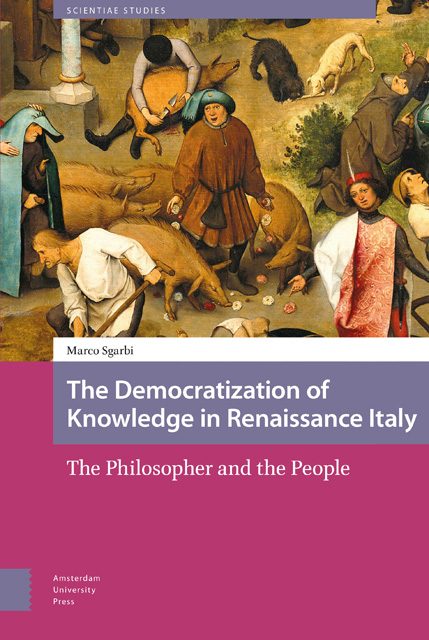6 - Communities of Recipients
Published online by Cambridge University Press: 15 June 2023
Summary
Abstract
Following Natalie Zemon Davis’s distinction between “audience” and “public,” chapter 6 assesses the communities of recipients of Aristotelian vernacular works. The first part of the chapter focuses on the intended public by examining explicit declarations of vulgarizers and democratizers of knowledge. It shows how vernacular works in fact were aimed at a transversal public composed of princes, men of letters, courtiers, nobles, rulers, artisans, apothecaries, woodsmen, physicians, navigators, women, children, idiots, and illiterates. This public was the same as for vernacularizations of religious texts. This first part highlights how not all their attempts to make knowledge more accessible were successful, and the limits of the process of democratization. The second part of the chapter deals with the real audience reconstructed on the basis of library catalogues and other archival sources. This second part shows how this real audience coincides with the intended public, in spite of the limitations of this kind of investigation.
Keywords: Recipients, Public, Audience, Readers
Intended public
Democratization is a process. Not all the intentions to democratize were successful. Intellectuals were well aware of the difficulties they faced in bringing knowledge to a wider public. In his Poetica d’Aristotile vulgarizzata et sposta – rightly selected by Luca Bianchi as an example of an erudite vernacular text requiring knowledge of Classical languages and literature – Lodovico Castelvetro shows himself to be conscious of having vulgarized “perhaps with greater ardour of spirit than felicity of result.” In a rare moment of modesty, Castelvetro acknowledges that despite being moved by genuine desire to clarify and share as far as possible the content of Aristotle’s poetics, the outcome is not what he had hoped for.
Another notable case is Alessandro Piccolomini’s In mechanicas quaestiones Aristotelis paraphrasis paulo quidem plenior (1547), vulgarized in 1582 by Oreste Vannocci Biringucci under the title Parafrasi di Monsignor Alessandro Piccolomini … sopra le Mechaniche d’Aristotele. Biringucci maintained that in order to “satisfy his just and ardent desire to benefit all, without prejudice of any kind, easily and happily, he [Piccolomini] set about adorning our language with every kind of science,” and above all “regretted having written in Latin, alongside certain other fine works, during his best years, and among his studies is also this paraphrase of the Mechaniche d’Aristotele, because he saw that since it was in Latin it was not accessible to those who could have made the best use of it,” that is “engineers and architects.”
- Type
- Chapter
- Information
- The Democratization of Knowledge in Renaissance ItalyThe Philosopher and the People, pp. 161 - 196Publisher: Amsterdam University PressPrint publication year: 2022



